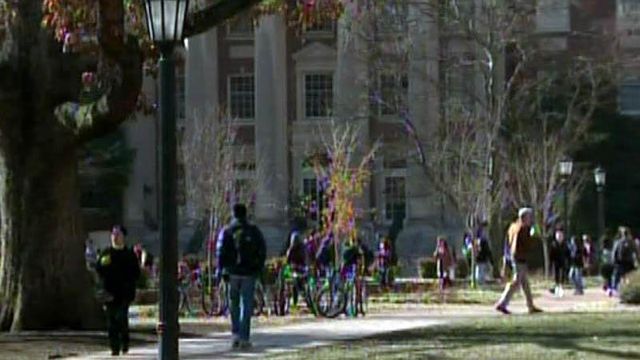UNC faculty working to engage athletes more in class
The NCAA investigation of the UNC-Chapel Hill football team has galvanized faculty efforts to engage the school's athletes more in classes and on campus, officials said Tuesday.
Posted — UpdatedOn Monday, the NCAA's Committee on Infractions put UNC on probation for three years, took away 15 football scholarships in that period and banned the team from postseason play next fall. The penalties resulted from a lengthy investigation into players' and a former assistant coach's dealings with agents and academic misconduct by players.
"The penalties are what they are," said Jan Boxill, chairwoman of the UNC Faculty Council and a professor of philosophy who has researched and written extensively about ethics in sports.
Rather than focusing on the impact of the penalties, Boxill said, she and other faculty members are more concerned about better incorporating student-athletes in UNC's academic culture.
She said she has been working directly with Director of Athletics Bubba Cunnningham and head football coach Larry Fedora in recent weeks. Both men want to make sure athletes succeed off the field as well as on, she said.
"If we want our students to be successful, faculty, staff, students and everybody is really involved," she said. "I think that it actually is bringing us together to see that we can make a difference for each other."
"I think the thing that is really impressive with this current staff is they are really focused on college students, and they have worked directly with college students," said Steve Reznick, a UNC professor of psychology and chairman of the faculty athletic committee.
Reznick said he was disappointed by the NCAA sanctions, which went beyond the punishment UNC imposed on itself, because the university has improved its academic efforts for student-athletes.
"I feel like the additional sanctions are punishing people who didn't do wrong and who are actually moving forward," he said. "The only positive I can see in the sanctions is it is sending to the broader world of athletics a message – do it right."
Boxill said the investigation put a spotlight on everybody's role in balancing academics and athletics at the school.
"I don't think that the (university's) reputation has been sullied to point that we can't recover. I do think that we are recovering," she said.
• Credits
Copyright 2024 by Capitol Broadcasting Company. All rights reserved. This material may not be published, broadcast, rewritten or redistributed.






